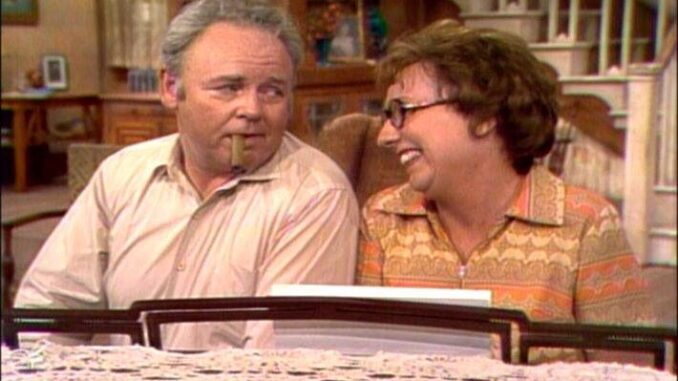
The 1960s were a tumultuous period for the United States, defined by major political and social upheaval. From the assassinations of JFK, Martin Luther King Jr., and Malcolm X, to the divisive Vietnam War and the sweeping changes brought about by the Civil Rights Movement, America was at a cultural crossroads. Amid these struggles, television—at least in its primetime offerings—remained largely disconnected from the pressing issues of the day. Instead of reflecting the turbulent nature of the real world, the most popular sitcoms presented a sanitized, idealized version of life. Shows like The Beverly Hillbillies and The Andy Griffith Show were set in idyllic, almost fictional universes, where conflict was more about misunderstandings than real-world societal struggles. These programs rarely ventured into difficult or controversial topics, instead offering up easy, feel-good resolutions to every problem that arose. However, with the advent of All in the Family in 1971, television took a sharp turn towards confronting the country’s most divisive issues head-on. Created by Norman Lear, All in the Family broke away from the traditions of its predecessors by placing a deeply flawed and unabashedly controversial character, Archie Bunker, at the heart of its narrative. Archie, a working-class, bigoted, and often offensive man, represented the conservative side of America in a way that was never before seen on television. In a world still grappling with issues like race relations, women’s rights, and the counterculture movements, the show did not shy away from highlighting Archie’s outdated views. His prejudices were openly discussed, often portrayed as the source of family conflict, but also as a window into the frustrations of a segment of the American population that felt left behind by the rapidly changing cultural landscape.
 The show’s unapologetic treatment of sensitive topics—from racial segregation to the women’s liberation movement—made it a trailblazer in TV history. Yet, it also sparked intense debate over its true message. While Norman Lear intended for Archie’s bigoted views to be satirized and exposed as absurd, the reality was that many viewers—especially those with conservative values—embraced the character, seeing him as a relatable figure who simply spoke truths that others were afraid to voice. This complex dynamic of satire and endorsement created an ongoing controversy about whether All in the Family served to challenge bigotry or simply gave it a platform. The impact of the show is still felt today, as it not only influenced future socially-conscious sitcoms like The Golden Girls and Modern Family but also paved the way for other shows that celebrated irreverence and controversial humor, such as Married…with Children. In the end, All in the Family is a powerful reminder of how television can both reflect and shape the culture, sometimes in ways that its creators never intended. While it introduced important discussions about social issues, it also highlighted how deeply ingrained prejudices could be normalized under the guise of humor and everyday life.
The show’s unapologetic treatment of sensitive topics—from racial segregation to the women’s liberation movement—made it a trailblazer in TV history. Yet, it also sparked intense debate over its true message. While Norman Lear intended for Archie’s bigoted views to be satirized and exposed as absurd, the reality was that many viewers—especially those with conservative values—embraced the character, seeing him as a relatable figure who simply spoke truths that others were afraid to voice. This complex dynamic of satire and endorsement created an ongoing controversy about whether All in the Family served to challenge bigotry or simply gave it a platform. The impact of the show is still felt today, as it not only influenced future socially-conscious sitcoms like The Golden Girls and Modern Family but also paved the way for other shows that celebrated irreverence and controversial humor, such as Married…with Children. In the end, All in the Family is a powerful reminder of how television can both reflect and shape the culture, sometimes in ways that its creators never intended. While it introduced important discussions about social issues, it also highlighted how deeply ingrained prejudices could be normalized under the guise of humor and everyday life.
